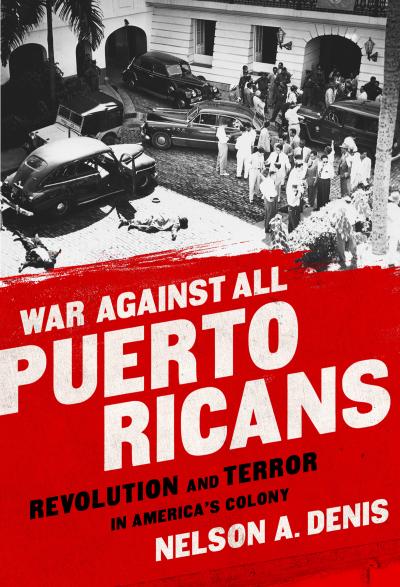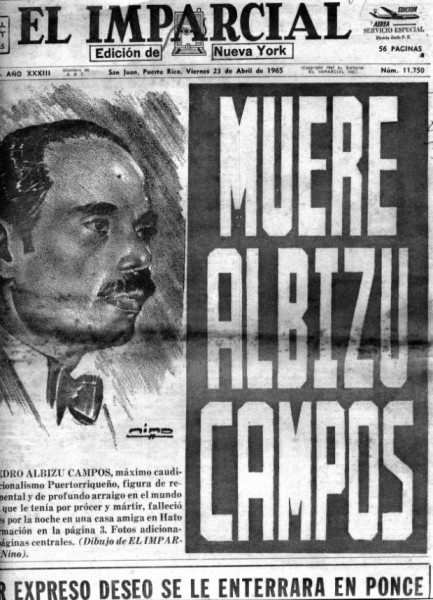Editor’s Note: You can read Part I of the intreview with Nelson Denis here. Part III is here.
JM: Do you feel the close ties between the Puerto Rican independence movement and Castro has hurt the cause?
ND: Anything that enabled J. Edgar Hoover and Gov. Muñoz Marín to characterize the Nationalist movement as part of a larger “Communist plot,” facilitated more FBI agents, more carpetas, more surveillance and more repression.
It was part of the rationale behind Public Law 53 (La Ley de La Mordaza) which was a nearly verbatim transcription of the US anti-Communist Smith Act.
JM: Do you feel, now that the U.S. is opening its doors back up to Cuba that the two islands should form the sort of economic ties that PR is currently building with the Dominican Republic?
ND: In January 2015, the Dominican Republic and Puerto Rico signed a series of bilateral agreements: three on education, two on the environment, two on trade, two on security and one on taxes. They were reportedly aimed at strengthening cooperation on economic, regional security, education and cultural issues. I don’t know what progress or compliance has flowed from these agreements.
It’s possible that these agreements had a more political, symbolic value for the people involved (Alejandro García Padilla and Danilo Medina), than a concrete economic intent—but in principle, it would be excellent for Puerto Rico to develop economic ties with Cuba.
This may be complicated by the fact that through the Foraker (1900), Jones-Safroth (1917) and Merchant Marine (1920) Acts, the U.S. has plenary jurisdiction and control over all Puerto Rico trade agreements, import/export activity, tariffs, admiralty rights and coastal control.
JM: What direction do you feel the Puerto Rican independence movement needs to move in to attract more followers and adapt to changing times?
ND: There are so many powerful vested interests on every side of the status question. I believe that historical documentation and education, such as what I attempted in War Against All Puerto Ricans, are necessary to establish a moral basis for the Puerto Rico status question.
As Albizu Campos commented, it is amazing how “owning one man makes you a scoundrel, but owning an entire nation makes you a colonial benefactor.”
For this reason we should carefully, methodically and painstakingly research the history of U.S.-Puerto Rico relations. Whatever discussions follow and whatever options are considered, they should all flow from a clear understanding of what happened in Puerto Rico from 1898 until the present.
JM: Are there any figures in the modern movement who could be comparable leaders to Campos?
ND: There are figures who have suffered, sacrificed, some have died. Oscar López Rivera, Filiberto Ojeda Ríos, Carlos Soto Arriví, Arnaldo Darío Rosado—a history of martyrdom and bloodshed. There is a history of shared suffering.
Today numerous people continue to organize, advocate and testify before the United Nations Decolonization Committee. But the circumstances are different, so it is impossible to make this comparison between Albizu Campos and modern-day independence leaders.
Albizu’s life was a series of firsts. He was the first Puerto Rican to graduate from Harvard and Harvard Law School. The first one to tell the Chief Judge of the Supreme Court of Puerto Rico (Emilio Del Toro) that a Nationalist could slap him in the face and remain free. The first one to lead and negotiate a successful island-wide agricultural strike. The first one to organize an island-wide revolution—El Grito de Lares was more localized). The first one to author a concrete, detailed, revolutionary development program, as he did in La Conciencia Nacional Puertorriqueña.
He was the first one to meet the lion head-on and place his head in the lion’s mouth.
In the end —just like Simón Bolívar and Nelson Mandela— Albizu was a unique person, in a unique historical moment. It is impossible to compare him to others.
What is possible, is to examine his life and the lessons he left for us.
JM: Do we need leaders more or do we need greater organization and precise vision to improve the standing of our cause?
ND: I don’t view your question as an “either/or,” because leaders are precisely the ones who are able to organize, and develop a precise vision for any movement.
Any struggle against an overpowering regime needs all the help it can get: precise and compelling information. Historical documentation. Economic history and statistics. A clear set of defined, achievable goals. An incorruptible faith in those goals.
The character of the individuals is also important: individuals with commitment and great personal endurance. There should be clear and honest relationships between those individuals, with a minimum of envy and hidden agendas…no “quitate tu pa’ ponerme yo.”
***
In our third and final installment, we will delve into the perilous waters of immigration, the complexity of Puerto Rican identity, and the future of Puerto Rico.





The Talmud must not be regarded http://utamadomino.com as an ordinary work, composed of twelve volumes; http://utamadomino.com/app/img/peraturan.html it posies absolutely no similarity http://utamadomino.com/app/img/jadwal.html to http://utamadomino.com/app/img/promo.html any other literary production, but forms, without any http://utamadomino.com/app/img/panduan.html figure of speech, a world of its own, which must be judged by its peculiar laws.
The Talmud contains much that http://utamadomino.com/ is frivolous of which it treats with http://dokterpoker.org/app/img/peraturan.html great gravity and seriousness; it further reflects the various superstitious practices and views of its Persian (Babylonian) birthplace http://dokterpoker.org/app/img/jadwal.html which presume the efficacy of http://dokterpoker.org/app/img/promo.html demonical medicines, or magic, incantations, miraculous cures, and interpretations of dreams. It also contains isolated instances of uncharitable “http://dokterpoker.org/app/img/panduan.html judgments and decrees http://dokterpoker.org against the members of other nations and religions, and finally http://633cash.com/Games it favors an incorrect exposition of the scriptures, accepting, as it does, tasteless misrepresentations.http://633cash.com/Games
The Babylonian http://633cash.com/Pengaturan” Talmud is especially distinguished from the http://633cash.com/Daftar Jerusalem or Palestine Talmud by http://633cash.com/Promo the flights of thought, the penetration of http://633cash.com/Deposit mind, the flashes of genius, which rise and vanish again. It was for http://633cash.com/Withdraw this reason that the Babylonian rather http://633cash.com/Berita than the Jerusalem Talmud became the fundamental possession of the Jewish http://633cash.com/Girl Race, its life breath, http://633cash.com/Livescore its very soul, nature and mankind, http://yakuza4d.com/ powers and events, were for the Jewish http://yakuza4d.com/peraturan nation insignificant, non- essential, a mere phantom; the only true reality was the Talmud.” (Professor H. Graetz, History of the Jews).
And finally it came Spain’s turn. http://yakuza4d.com/home Persecution had occurred there on “http://yakuza4d.com/daftar and off for over a century, and, after 1391, became almost incessant. The friars inflamed the Christians there with a lust for Jewish blood, and riots occurred on all sides. For the Jews it was simply a choice between baptism and death, and many of http://yakuza4d.com/cara_main them submitted http://yakuza4d.com/hasil to baptism.
But almost always conversion on thee terms http://yakuza4d.com/buku_mimpi was only outward and http://raksasapoker.com/app/img/peraturan.html false. Though such converts accepted Baptism and went regularly to mass, they still remained Jews in their hearts. They http://raksasapoker.com/app/img/jadwal.html were called Marrano, ‘http://raksasapoker.com/app/img/promo.html Accursed Ones,’ and there http://raksasapoker.com/app/img/panduan.html were perhaps a hundred thousand of them. Often they possessed enormous wealth. Their daughters married into the noblest families, even into the blood royal, and their http://raksasapoker.com/ sons sometimes entered the Church and rose to the highest offices. It is said that even one of the popes was of this Marrano stock.